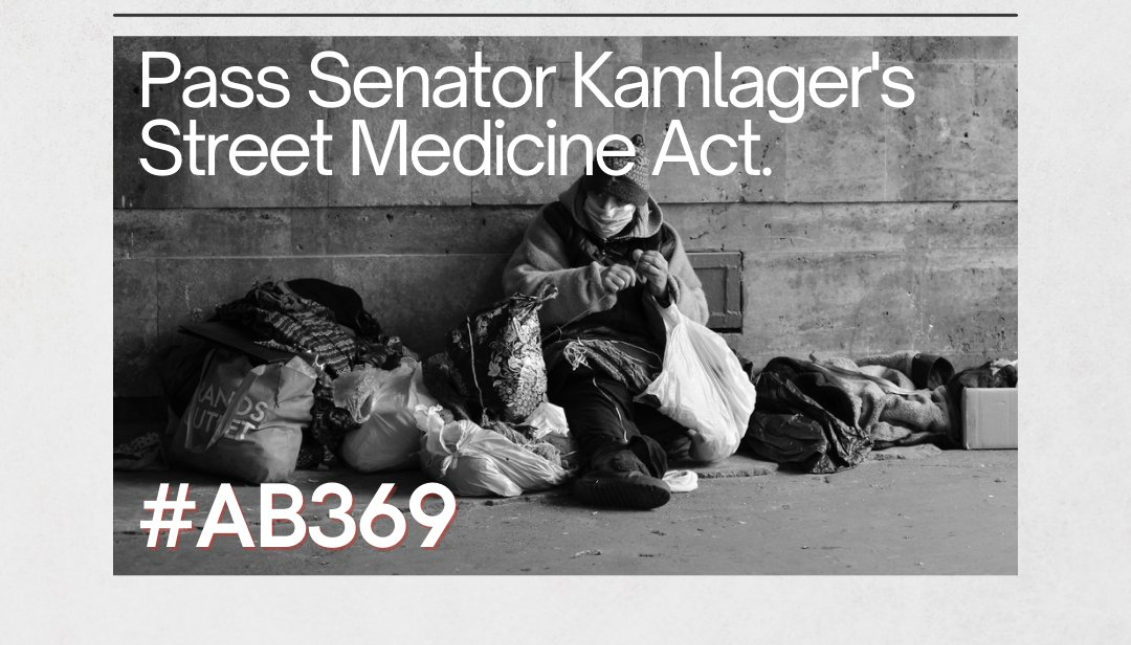
There’s a race to recognize ‘street medicine’ in California to provide proper care to the L.A.’s homeless
Assembly Bill 368 would remove unnecessary barriers for treatment of the city’s unhoused population.
Last year, nearly 23% of the roughly 1,300 people experiencing homelessness who died in Los Angeles passed away from underlying health issues. According to the Street Medicine Institute, even for unhoused people who have health insurance, 73% have never seen a health provider.
Assembly Bill 369 (AB 369), a street medicine bill introduced by California Senator Sydney Kamlager, seeks to remove barriers for L.A.’s unhoused population, by allowing care to be provided outside the walls of traditional medical clinics.
This would include healthcare provided on the streets, as well as shelter-based care and services for people residing in transitional housing.
“This is a bill about humanity and about saving Californians. It is a crisis that folks are unhoused and it’s a reality that a lot of folks who are unhoused are also sick and in need of medical care just like anyone else,” Kamlager said.
Today, I was in the passenger seat watching @keckmedusc treat infections and just offer compassion to folks in Skid Row, Lincoln Heights & #ProjectRoomkey.
— Sydney Kamlager (@sydneykamlager) August 7, 2021
Being committed to “meeting people where they are”...also means the streets!! We gotta get #AB369 law. pic.twitter.com/QidwExS9Wg
Dr. Brett Feldman, the director of street medicine for the Keck School of Medicine at the University of Southern California, and his wife, Corrine, a physician’s assistant, are currently the health providers for an unhoused L.A. resident named Doug.
Doug lives in a tent overlooking a freeway in downtown L.A. while trying to manage his diabetes and high-blood pressure. Feldmen and Corrine see him twice weekly to refill his prescriptions, check his blood pressure and check up on his overall well-being.
“Street medicine recognizes that people experiencing homelessness can’t access healthcare the way the rest of us do,” Feldman told LAist.
In 2018, the California Department of Health Care Services established the Medi-Cal Health Homes Program to cater to eligible Medi-Cal beneficiaries with complex needs and chronic conditions.
A 2020 UCLA study that evaluated the program showed that of all those eligible, 13% were successfully enrolled, but only 3.5% were experiencing homelessness.
RELATED CONTENT
Feldman said that this just highlights the difficulty in caring for unhoused people from inside four walls.
Heart of LA supports #AB369 The Street Medicine Act - because people experiencing homelessness should have access to health care, no matter where it's provided. Street medicine programs improve health outcomes & lives. It's time to make this law. @sydneykamlager https://t.co/REl1SwbFBx
— HeartLADems (@HeartLADems) August 9, 2021
Doug told LAist that street medicine has been a blessing in his life, and without Feldman and Corrine, he probably wouldn’t take any medications, and be more susceptible to infections.
Street medicine teams like Feldman’s also treat people in transitional housing, including Project Roomkey, a joint effort by the state, county and Los Angeles Homeless Services Authority, to convert hotel and motel rooms into housing.
According to the Street Medicine Institute, the practice has been shown to reduce expensive hospital admissions by two-thirds, but Medi-Cal does not recognize the “street” as a location for providing care for people like Doug, who overlooks the freeway, or for those living in housing such as Project Roomkey.
#AB369 The Street Medicine Act, in part, expands access to Medi-Cal for unhoused people giving them access to care outside of traditional settings.
— Ethan Ward (@iamethanward) August 6, 2021
You’ll hear from Doug and Louis, both unhoused men, about how street med teams impact their lives Monday on @KPCC + @LAist pic.twitter.com/T2s9NolMc0
Kamlager said that AB 369 will allow doctors to go out and meet unhoused people where they are and get reimbursed for their services, and she is “depending” on Gov. Gavin Newsome to sign the bill if it passes.
“We should all be treated the same and all have access to healthcare, and have a doctor who cares enough and willing to do the steps that are necessary to get the treatment,” Kamlager told Laist.
Currently, the California State Senate is debating the bill, and it should land on Gov. Newsom’s desk for approval before Oct. 10, the last day this year’s legislation can be signed into law.











LEAVE A COMMENT: